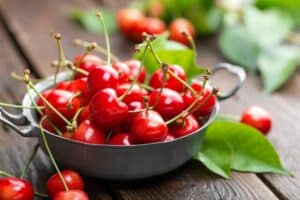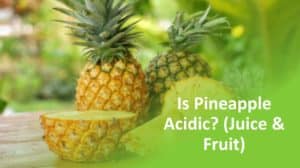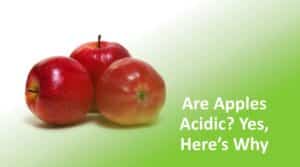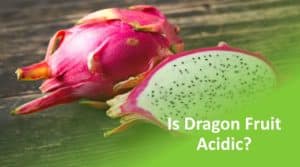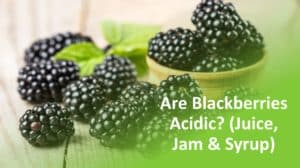Grapes are undoubtedly one of nature’s most impressive fruits — not because they can be turned into wine — but because they are acidic in nature and turn alkaline after digestion.
The pH scale indicates that they are positively acidic, while the PRAL scale indicates that they are negative in producing acid after digestion.
They aren’t the only alkaline-forming fruits, though. Grapefruits, named after grapes for growing in bunches, fall under the same category of superfruits.
The secret is that even though these fruits enter our mouths as acidic food, they leave an alkaline residue in our bodies. This residue eliminates the acid in our body that makes us susceptible to diseases.
Sounds promising so far, but are they safe to eat during acid reflux? Are grape juice, wine, and raisins acidic? Let’s find out.

pH Value of Grapes
Grape has a pH value that ranges from 1.9 to 4 which makes it an acidic fruit. Grapes contain high amounts of malic, tartaric, and citric acids. These acids are at their highest concentration when the grapes are unripe. However, the acid content decreases as they mature.
Acidity is measured using a pH scale ranging from 1 — 14. A substance is acidic if its pH is 6.9 or below and alkaline if it is 7.1 or above. 7 is both neutral and optimal.
Most grocery stores sell the Concord, Niagara, and seedless grape varieties. The pH of the Concord variety ranges from 2.8 to 3, whereas Niagara’s ranges from 2.8 to 3.2. The seedless grapes have the highest pH ranging between 2.9 — 3.8.
PRAL Value of Grapes
The higher a food’s PRAL value, the more acid your body produces when digesting it. Grapes have a negative PRAL value, so your body doesn’t produce excess acid after consuming them. Instead, your body pH becomes more alkaline.
PRAL stands for potential renal acid load and measures how acidic or alkaline a food can be when digested in the body.
Generally, foods with a high protein content—such as meat, poultry, cheese, and eggs have a higher PRAL value and cause the body to produce more acid — whereas fruits and vegetables have a lower or negative PRAL.
Although grapes have a pH between 1.9 to 4 when consumed, they can enhance blood alkalinity after digestion.
Do Grapes Cause Acid Reflux and GERD?
If you suffer from acid reflux and GERD, eating large amounts of grapes will trigger symptoms of heartburn.
Eating very small amounts may be harmless, but stay away from the sourer varieties as they are higher in acid content. Consume them in moderation until you better understand how they impact your health.
If you experience acid reflux, you know the feeling very well — a slight hiccup followed by a burning sensation in the chest and throat, also known as heartburn. If acid reflux starts to happen frequently, it may develop into a chronic condition known as gastroesophageal reflux disease (GERD).
Adding acidic food to an already acidic environment would worsen heartburn symptoms. To stay on the safe side, eat grapes as part of a balanced meal — mix them with melons, bananas, yogurt, vegetables, and beans — this way, you’ll balance the stomach’s acid and maintain neutral pH levels in your body.
Are Grape Juice, Grape Jam, and Grape Jelly Acidic?
Jam, jelly, and grape juice are all acidic and aren’t recommended during acid reflux and GERD.
Grape juice has a pH between 3.2 and 4. Jam and jellies are usually more acidic, with a pH ranging from 2.8 to 3.4. These products contain additives and sugars that can increase heartburn. Skip these products when you’re experiencing acid reflux and GERD.
Is Wine Acidic?
Yes, all alcoholic beverages, including wine, are acidic. Wine has a pH between 3 — 4, but its alcohol content makes it highly acidic to the stomach.

People who regularly consume alcohol have a greater likelihood of getting acid reflux. Alcohol relaxes the muscles around the stomach, which may push the contents of the stomach upwards and thus lead to the burning sensation known as heartburn.
That is why doctors advise you to refrain from wine and all other alcoholic beverages when dealing with GERD or acid reflux.
Raisins Acidity
Raisins are acidic, with a pH ranging from 3.8 — 4.1, so they aren’t recommended in excess amounts during heartburn.
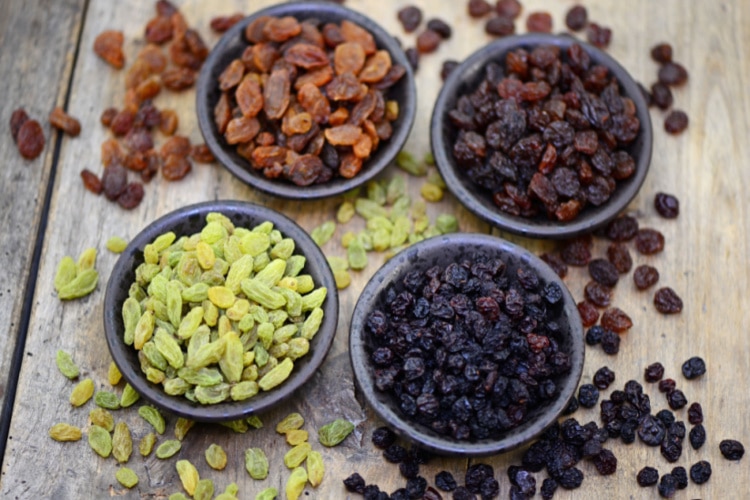
But here’s what’s remarkable about raisins — despite their acidic nature, they have a low PRAL value once digested. Their pH changes to 8.5, making them alkaline. So if you don’t have a problem with heartburn, you can eat raisins to increase the alkalinity of your body.
They contain essential minerals such as iron, copper, magnesium, and potassium. These alkaline or “basic” minerals help manage acidity levels in the stomach.
Raisins are also high in fiber, which is essential for digestion and liquid absorption in the stomach. A half-cup of raisins has around 3.3 grams of fiber and can fulfill 10% to 24% of your daily fiber needs.
Grapefruit Acidity
Grapefruit has a pH range of 2.9 — 3.7, making it acidic in nature. But when digested, grapefruit becomes very alkaline, with a pH of 8.5.
Since it’s acidic before digestion, it should be avoided during acid reflux or GERD.
Is Grapefruit Juice Acidic?
Canned grapefruit juice has a pH value of 2.9 — 3.2 and is more acidic than raw grapefruit. You shouldn’t consume it if you are prone to heartburn.
For those that don’t suffer from acid reflux and GERD, we recommend drinking freshly squeezed grapefruit juice that’s free of additives and rich in nutrients.
Is Canned Grapefruit Acidic?
Canned grapefruit has a pH value of 3 and is acidic. Canned products are filled with additives, preservatives, and extra sugar, which may worsen your acid reflux. Avoid these products, especially during symptoms of heartburn.
Conclusion
Grapes are acidic in nature, with a pH of 1.9 – 4. Therefore, you shouldn’t consume them excessively during acid reflux and GERD symptoms.
Juice, wine, jams, jellies, and raisins all have acidic pH and could trigger symptoms of acid reflux and GERD.
However, since grapes have a negative PRAL value, they won’t increase acid production in the body if you don’t already suffer from acid reflux. On the contrary, they’ll make your body more alkaline. It’s the same with grapefruits.
To summarize, if you have acid reflux or GERD, you should avoid these fruits, consume them in limited amounts, or pair them with alkaline foods. If you do not have any ailments, enjoy these fruits and their alkalizing properties.

